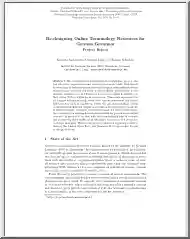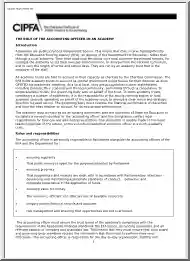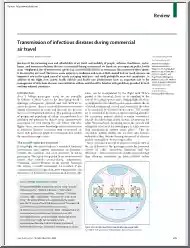Nincs még értékelés. Legyél Te az első!
Mit olvastak a többiek, ha ezzel végeztek?
Tartalmi kivonat
FREQUENTLY ASKED QUESTIONS (FAQ) ABOUT COMIRNATY VACCINE Q1: What vaccine is being registered? A1: The Drug Control Authority (DCA) in its 352th meeting has granted Pfizer (M) Sdn Bhd’s COMIRNATY Concentrate for Dispersion for Injection a CONDITIONAL REGISTRATION on 8th January 2021. COMIRNATY contains 30µg of nucleoside-modified mRNA strand formulated as an RNA- lipid nanoparticle that encodes the viral spike (S) protein of SARS-CoV-2. Q2: What are the conditions of the registration? A2: Since the application was based on rolling submission of the latest data, the Product Registration Holder (PRH) will need to ensure all outstanding documents are submitted and deemed satisfactory by NPRA according to the timeline given. Apart from that, the PRH is required to monitor the safety profile of the registered vaccine and inform NPRA soonest possible of any untoward events. The PRH is also required to conduct all activities planned under the Risk Management Plan (RMP) as well as
submitting Monthly Safety Summary Report to NPRA. The validity of this conditional approval is one (1) year. During this period, the DCA will periodically be updated with all necessary information related to the quality, safety and efficacy of this vaccine. The registration can be revoked if the conditions are not fulfilled by the PRH or if the benefit over risk of the vaccine is no longer deemed beneficial. Q3: Why is COMIRNATY granted a conditional registration? A3: Clinical studies for COMIRNATY are currently still on-going. The current final analysis provided clearly show a positive benefit over risk and hence making this available to the nation. However, further monitoring of the efficacy and safety will be needed in order to ensure that the benefit over risk of this vaccine remains positive. Q4: Who can be given COMIRNATY? A4: COMIRNATY is indicated for the active immunization to prevent COVID-19 caused by SARS-CoV-2 virus, in individuals 18 years of age and older. The use of
this vaccine should be in accordance with the recommendations by the Ministry of Health Malaysia. Page 5 of 8 Q5: Who can’t be given COMIRNATY? A5: At the moment, there are insufficient clinical evidence to support vaccination in these population: immunocompromised, autoimmune disorders, pregnant or breastfeeding women. Therefore, it is currently not recommended for these population to be immunised. However, these recommendations may change as more clinical data is obtained COMIRNATY should not be given to individuals who are known to have allergic reactions to any of the ingredients in the vaccine (mRNA, lipids ((4-hydroxybutyl)azanediyl)bis(hexane-6,1-diyl)bis(2-hexyldecanoate), 2 [(polyethylene glycol)-2000]-N,Nditetradecylacetamide, 1,2-Distearoyl-sn-glycero-3-phosphocholine, and cholesterol), potassium chloride, potassium dihydrogen phosphate, sodium chloride, disodium phosphate dihydrate, and sucrose). The second dose of the vaccine should not be given to individuals who
had a severe allergic reaction after the first dose of this vaccine. Please consult your doctor if you: have any form of allergies, bleeding disorder, or taking any blood thinning medications recently or currently receiving treatment for cancer, organ or stem cell transplantation had a previous history of COVID-19 infection, had previously received another COVID-19 vaccine (whether during an immunisation program or was involved as a subject in a COVID-19 clinical study) or previously received passive antibodies therapy for COVID-19 Q6: How COMIRNATY is given? A6: COMIRNATY should be injected into the deltoid muscle of the upper arm as a course of 2 doses (0.3mL each) 21 days apart Q7: How well does COMIRNATY prevent COVID-19? A7: In the final analysis of the phase III clinical trial, the vaccine was 95% effective in preventing symptomatic COVID-19 disease following completion of 2 doses of the vaccine regime. Page 6 of 8 Q8: How long will COMIRNATY provide protection?
A8: As the clinical trial is still currently ongoing, no data is available to inform about the duration of protection that the vaccine will provide. This however will be made known once updated data is available Q9: Can people who have already had COVID-19 get COMIRNATY? A9: Available data indicate that COMIRNATY is safe when given in people with evidence of prior COVID-19 disease. Since previously infected individuals can be at risk of COVID-19 (i.e reinfection), vaccination may be offered to them Q10: Can pregnant or breastfeeding women receive COMIRNATY? A10: Pregnant or breastfeeding women were excluded in the clinical trials. Since no data on the safety and efficacy of this vaccine is available in these population, current evidence does not recommend for these groups to be immunised until further available data is obtained. Q11: Can children receive COMIRNATY? A11: Currently in Malaysia, the vaccine is indicated for individuals 18 years of age and older. This is because there is
not enough data yet to determine the effectiveness and safety of this vaccine in those under 18 years old. Hence children below the age of 18 should not take the vaccine until further data is made available. Q12: What are the side effects of COMIRNATY? A12: COMIRNATY can cause the following side effects : Very common side effects (may affect more than 1 in 10 people): injection site pain, injection site swelling, tiredness, headache, muscle pain, joint pain, chills and fever. Common side effects (may affect up to 1 in 100 people): injection site redness and nausea. Uncommon side effects (may affect up to 1 in 1000 people): enlarged lymph nodes, feeling unwell, pain in limb, insomnia and injection site itching. Rare side effects (may affect up to 1 in 10,000 people): temporary one-sided facial drooping. Not known side effects (cannot be estimated from the available data): severe allergic reaction. Page 7 of 8 There is a remote chance that the vaccine could
cause a severe allergic reaction even though the causal relationship has not been ascertained yet. A severe allergic reaction would usually occur within a few minutes to one hour after getting a dose of the vaccine. Signs of a severe allergic reaction can include difficulty in breathing, swelling of your face and throat, a fast heartbeat, a bad rash all over your body or dizziness and weakness. Recipient will be monitored 15-30 minutes after the administration of this vaccine at the vaccination centre. During marketing of COMIRNATY in Malaysia, NPRA will monitor its use to ensure effectiveness and safety. Please inform your healthcare providers or report any side effects to the National Centre for Adverse Drug Reaction Monitoring by visiting the website npra.govmy [Consumers > Reporting Side Effects to Medicines (ConSERF) or Vaccines (AEFI)] Q13: What should I do after I am vaccinated? A13: All individuals should continue to follow the country’s SOP. Practice the 3Ws (Wash, Wear,
Warn) and avoid the 3Cs (Crowded space, Confined space, Close conversation). For further information regarding COMIRNATY Concentrate for Dispersion for Injection, please refer to the Package Insert and Patient Information Leaflet. https://quest3plus.bpfkgovmy/pmo2/detailphp?type=product&id=MAL21016022AZ Page 8 of 8
submitting Monthly Safety Summary Report to NPRA. The validity of this conditional approval is one (1) year. During this period, the DCA will periodically be updated with all necessary information related to the quality, safety and efficacy of this vaccine. The registration can be revoked if the conditions are not fulfilled by the PRH or if the benefit over risk of the vaccine is no longer deemed beneficial. Q3: Why is COMIRNATY granted a conditional registration? A3: Clinical studies for COMIRNATY are currently still on-going. The current final analysis provided clearly show a positive benefit over risk and hence making this available to the nation. However, further monitoring of the efficacy and safety will be needed in order to ensure that the benefit over risk of this vaccine remains positive. Q4: Who can be given COMIRNATY? A4: COMIRNATY is indicated for the active immunization to prevent COVID-19 caused by SARS-CoV-2 virus, in individuals 18 years of age and older. The use of
this vaccine should be in accordance with the recommendations by the Ministry of Health Malaysia. Page 5 of 8 Q5: Who can’t be given COMIRNATY? A5: At the moment, there are insufficient clinical evidence to support vaccination in these population: immunocompromised, autoimmune disorders, pregnant or breastfeeding women. Therefore, it is currently not recommended for these population to be immunised. However, these recommendations may change as more clinical data is obtained COMIRNATY should not be given to individuals who are known to have allergic reactions to any of the ingredients in the vaccine (mRNA, lipids ((4-hydroxybutyl)azanediyl)bis(hexane-6,1-diyl)bis(2-hexyldecanoate), 2 [(polyethylene glycol)-2000]-N,Nditetradecylacetamide, 1,2-Distearoyl-sn-glycero-3-phosphocholine, and cholesterol), potassium chloride, potassium dihydrogen phosphate, sodium chloride, disodium phosphate dihydrate, and sucrose). The second dose of the vaccine should not be given to individuals who
had a severe allergic reaction after the first dose of this vaccine. Please consult your doctor if you: have any form of allergies, bleeding disorder, or taking any blood thinning medications recently or currently receiving treatment for cancer, organ or stem cell transplantation had a previous history of COVID-19 infection, had previously received another COVID-19 vaccine (whether during an immunisation program or was involved as a subject in a COVID-19 clinical study) or previously received passive antibodies therapy for COVID-19 Q6: How COMIRNATY is given? A6: COMIRNATY should be injected into the deltoid muscle of the upper arm as a course of 2 doses (0.3mL each) 21 days apart Q7: How well does COMIRNATY prevent COVID-19? A7: In the final analysis of the phase III clinical trial, the vaccine was 95% effective in preventing symptomatic COVID-19 disease following completion of 2 doses of the vaccine regime. Page 6 of 8 Q8: How long will COMIRNATY provide protection?
A8: As the clinical trial is still currently ongoing, no data is available to inform about the duration of protection that the vaccine will provide. This however will be made known once updated data is available Q9: Can people who have already had COVID-19 get COMIRNATY? A9: Available data indicate that COMIRNATY is safe when given in people with evidence of prior COVID-19 disease. Since previously infected individuals can be at risk of COVID-19 (i.e reinfection), vaccination may be offered to them Q10: Can pregnant or breastfeeding women receive COMIRNATY? A10: Pregnant or breastfeeding women were excluded in the clinical trials. Since no data on the safety and efficacy of this vaccine is available in these population, current evidence does not recommend for these groups to be immunised until further available data is obtained. Q11: Can children receive COMIRNATY? A11: Currently in Malaysia, the vaccine is indicated for individuals 18 years of age and older. This is because there is
not enough data yet to determine the effectiveness and safety of this vaccine in those under 18 years old. Hence children below the age of 18 should not take the vaccine until further data is made available. Q12: What are the side effects of COMIRNATY? A12: COMIRNATY can cause the following side effects : Very common side effects (may affect more than 1 in 10 people): injection site pain, injection site swelling, tiredness, headache, muscle pain, joint pain, chills and fever. Common side effects (may affect up to 1 in 100 people): injection site redness and nausea. Uncommon side effects (may affect up to 1 in 1000 people): enlarged lymph nodes, feeling unwell, pain in limb, insomnia and injection site itching. Rare side effects (may affect up to 1 in 10,000 people): temporary one-sided facial drooping. Not known side effects (cannot be estimated from the available data): severe allergic reaction. Page 7 of 8 There is a remote chance that the vaccine could
cause a severe allergic reaction even though the causal relationship has not been ascertained yet. A severe allergic reaction would usually occur within a few minutes to one hour after getting a dose of the vaccine. Signs of a severe allergic reaction can include difficulty in breathing, swelling of your face and throat, a fast heartbeat, a bad rash all over your body or dizziness and weakness. Recipient will be monitored 15-30 minutes after the administration of this vaccine at the vaccination centre. During marketing of COMIRNATY in Malaysia, NPRA will monitor its use to ensure effectiveness and safety. Please inform your healthcare providers or report any side effects to the National Centre for Adverse Drug Reaction Monitoring by visiting the website npra.govmy [Consumers > Reporting Side Effects to Medicines (ConSERF) or Vaccines (AEFI)] Q13: What should I do after I am vaccinated? A13: All individuals should continue to follow the country’s SOP. Practice the 3Ws (Wash, Wear,
Warn) and avoid the 3Cs (Crowded space, Confined space, Close conversation). For further information regarding COMIRNATY Concentrate for Dispersion for Injection, please refer to the Package Insert and Patient Information Leaflet. https://quest3plus.bpfkgovmy/pmo2/detailphp?type=product&id=MAL21016022AZ Page 8 of 8




 Jellemzően a vállalkozás beindítása előtt elkészített tanulmány, de készülhet már meglévő vállalkozás esetében is. Az üzleti tervezés egy olyan tervezési módszer, amely keretet a cég céljainak eléréséhez. Írásunk módszertani útmutatóként szolgál azoknak, akik érdeklődnek az üzleti tervezés iránt.
Jellemzően a vállalkozás beindítása előtt elkészített tanulmány, de készülhet már meglévő vállalkozás esetében is. Az üzleti tervezés egy olyan tervezési módszer, amely keretet a cég céljainak eléréséhez. Írásunk módszertani útmutatóként szolgál azoknak, akik érdeklődnek az üzleti tervezés iránt.